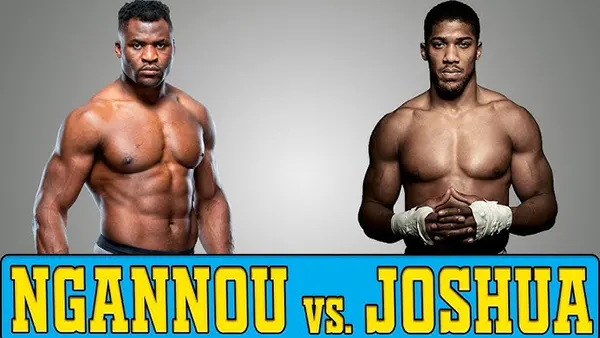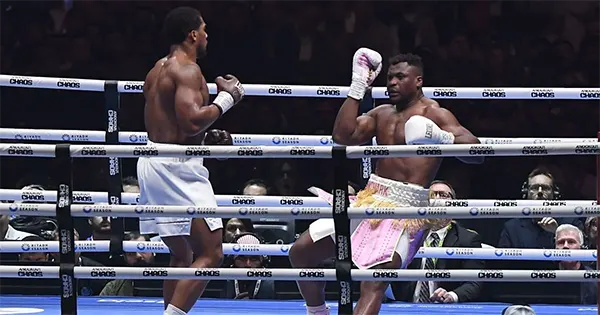
Legendary Night in Saudi Arabia: How Joshua vs Ngannou Changed Boxing Geopolitics
The boxing world witnessed a seismic shift on the night of 8 February 2025, when Anthony Joshua stepped into the ring with former UFC heavyweight champion Francis Ngannou in Riyadh, Saudi Arabia. This wasn’t just another boxing match. It was a spectacle with far-reaching geopolitical implications, showcasing the growing influence of Saudi Arabia in the global sporting arena. With millions of eyes watching, the event blended athleticism, diplomacy and economic ambition, reshaping the way boxing is perceived on the world stage.
Saudi Arabia’s Vision and Its Boxing Ambitions
Saudi Arabia’s engagement with international boxing events is no coincidence. The Kingdom’s Vision 2030 initiative aims to diversify its economy and reduce reliance on oil by investing in sectors like tourism, culture and sports. Hosting Joshua vs Ngannou was a calculated move to put Saudi Arabia at the heart of global sporting narratives. With glittering production, world-class facilities, and top-tier fighters, the event demonstrated the country’s capacity to host major sporting spectacles that rival Las Vegas or London.
The fight brought in high-profile celebrities, political figures, and media outlets from across the globe. Crown Prince Mohammed bin Salman’s strategic push to rebrand Saudi Arabia through such events reflects a broader attempt to change perceptions of the region. By creating high-stakes, globally relevant sporting events, Saudi Arabia is asserting itself as a cultural powerhouse, using boxing as a tool for diplomacy and image-building.
Additionally, the nation’s increasing investment in sports aligns with soft power strategies used by other countries. By creating a spectacle around Joshua vs Ngannou, Saudi Arabia has started to draw global boxing talent and promoters into its orbit, challenging traditional hubs of boxing influence like the UK and USA.
The Economic Stakes and Sporting Ecosystem
Hosting a fight of this magnitude cost Saudi Arabia upwards of $100 million, but the economic returns are manifold. Hotels were packed, tourism surged, and the global broadcasting rights alone attracted massive revenues. The fight night turned Riyadh into the centre of attention for sports and entertainment media, setting a precedent for future events.
The fight also spurred growth in local sports infrastructure. New training centres, partnerships with global promoters, and initiatives to develop local talent are part of the post-event legacy. The Ministry of Sport has confirmed plans to build new stadiums and nurture boxing academies aimed at elevating domestic athletes to international standards.
Saudi Arabia isn’t just hosting; it’s cultivating. This deliberate evolution from venue to stakeholder is what makes the event more than a single night—it marks a shift in global boxing governance. Countries now recognise Saudi Arabia as a serious player, capable of shaping the sport’s future through funding and strategic event placement.
Joshua vs Ngannou: A Clash of Worlds
The match-up itself was historic. Anthony Joshua, former unified heavyweight boxing champion, faced off against Francis Ngannou, who had made waves in his 2023 fight with Tyson Fury, despite being a boxing novice. Their bout symbolised more than sporting rivalry—it was a meeting of two different combat cultures, uniting fans from boxing and MMA alike in anticipation.
Joshua’s tactical superiority ultimately earned him a win via technical knockout in the second round. But Ngannou’s sheer presence, strength, and charisma ensured the bout wasn’t a one-sided affair in the public eye. His crossover appeal as a former UFC star drew a significant portion of the global audience who might not have tuned in otherwise.
The fight showcased how traditional boxing must now adapt to hybrid matchups and a new fanbase interested in drama and diversity as much as belts and rankings. It also confirmed that athletes from outside boxing can no longer be dismissed as unworthy—Ngannou’s presence was both valid and valuable to the sport.
Public Perception and Media Influence
Media coverage of the event was extensive and mostly favourable. Joshua’s victory was praised, but Ngannou was hailed as a disruptor, a fresh force challenging the orthodox hierarchy of heavyweight boxing. Social media buzzed for days, with hashtags related to the bout trending globally before and after the fight.
Major sports outlets noted how the bout blurred lines between disciplines, bridging fans of MMA and boxing in a shared spectacle. Critics also highlighted how Saudi Arabia managed to control the narrative, framing itself as a forward-thinking host rather than a controversial state with a complex political history.
This careful media strategy allowed the Kingdom to dominate headlines for all the right reasons. The boxing world is increasingly shaped by where stories unfold—and Saudi Arabia has learned to craft stories that amplify its desired global image.

Future Implications for Global Boxing
The Joshua vs Ngannou event wasn’t just a milestone—it was a model. Other nations are now reevaluating their role in boxing promotion and investment. As Saudi Arabia carves out a role beyond simple hosting and into matchmaking and talent development, it sends a clear message: the epicentre of boxing may be shifting eastward.
Boxing promoters, organisations and broadcasters must now consider Riyadh as a central hub. The financial allure and high-calibre facilities offer compelling incentives, particularly as traditional venues face growing scrutiny over costs, regulations, and audience engagement.
Moreover, fighters themselves have taken notice. Big purses, global spotlight, and elite opponents in Saudi Arabia are leading many to rethink career trajectories. Several upcoming fights in 2025 and 2026 are already being negotiated for Middle Eastern venues, further validating the region’s rising dominance.
Long-Term Legacy and Ethical Concerns
While the event was widely seen as a success, it also raises questions about ethics and responsibility. Can the sport thrive without addressing concerns over human rights and political context? Critics argue that boxing, like football before it, may become a pawn in geopolitical strategies that prioritise image over principle.
Nonetheless, the sport’s governing bodies have shown willingness to embrace Saudi investment, focusing on growth and opportunity. The balance between moral scrutiny and economic benefit will remain a central theme as the region hosts more major events.
Still, the fight night delivered unmatched visibility for boxing, sparked necessary debates, and ushered in a new era of sport where location, culture and diplomacy are intertwined. The ring is now a global stage—and Saudi Arabia is determined to own it.
